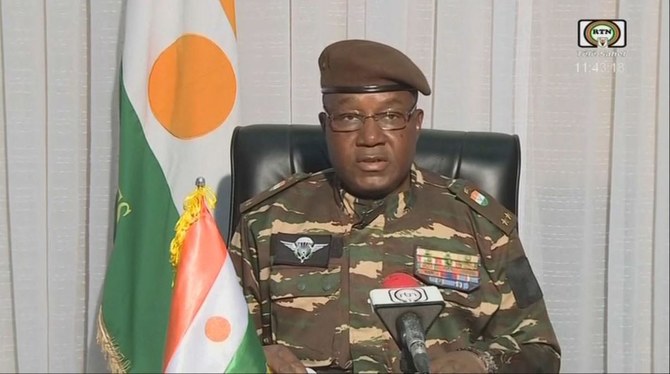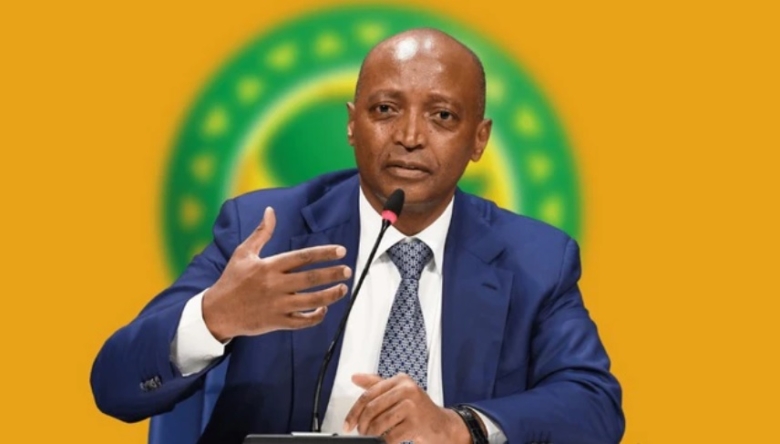The general who led a coup in Niger defended the takeover on state television Friday and asked for support from the nation and international partners, as concerns grew that the political crisis could set back the country’s fight against jihadists and increase Russia’s influence in West Africa.
Various factions of Niger’s military have reportedly wrangled for control since members of the presidential guard detained President Mohamed Bazoum, who was elected two years ago in Niger’s first peaceful, democratic transfer of power since independence from France. As Gen. Abdourahmane Tchiani spoke, state TV identified him as the leader of the group of soldiers who said they staged the coup, and his appearance seemed to be an effort to show he was in charge.
Niger is seen as the last reliable partner for the West in efforts to battle jihadists linked to al-Qaida and the Islamic State group in Africa’s Sahel region, where Russia and Western countries have vied for influence in the fight against extremism. France has 1,500 soldiers in the country who conduct joint operations with the Nigeriens, and the United States and other European countries have helped train the nation’s troops.
Extremists in Niger have carried out attacks on civilians and military personnel, but the overall security situation is not as dire as in neighboring Mali and Burkina Faso — both of which have ousted the French military. Mali has turned to the Russian private military group Wagner, and it’s believed the mercenaries will soon be in Burkina Faso. Now there are concerns Niger could follow suit.
“We can no longer continue with the same approaches proposed so far, at the risk of witnessing the gradual and inevitable demise of our country,” Tchiani, who also goes by Omar Tchiani, said in the address. “That is why we decided to intervene and take responsibility.”
“I ask the technical and financial partners who are friends of Niger to understand the specific situation of our country in order to provide it with all the support necessary to enable it to meet the challenges,” he said.
If the takeover is designated as a coup by the United States, Niger stands to lose millions of dollars of military aid and assistance.
Bazoum has not resigned and he defiantly tweeted from detention on Thursday that democracy would prevail. It’s not clear who enjoys the support of most of the population, but several hundred people gathered in the capital, Niamey, that day and chanted support for Wagner while waving Russian flags.
“We’re fed up,” said Omar Issaka, one of the protestors. “We are tired of being targeted by the men in the bush. ... We’re going to collaborate with Russia now.”
Tchiani’s criticism of Bazoum’s approach and of how security partnerships have worked in the past will certainly make the U.S., France, and the EU uneasy, said Andrew Lebovich, a research fellow with the Clingendael Institute.
“So that could mark potentially some shifts moving forward in Niger security partnerships,” he said.
Even as Tchiani sought to project control, the situation appeared to be in flux. A delegation from neighboring Nigeria hoping to mediate left shortly after arriving, and the president of Benin, nominated as a mediator by a regional body, had not arrived.
Earlier, an analyst who had spoken with participants in the talks said that the presidential guard was negotiating with the army about who should be in charge. The analyst spoke on condition they not to be named because of the sensitive situation.
A western military official in Niger who was not authorized to speak publicly to the media also said that the military factions were believed to be negotiating, and that situation remained tense and violence could erupt.
Speaking in Papua New Guinea, French President Emmanuel Macron condemned the coup as “completely illegitimate and profoundly dangerous for the Nigeriens, Niger and the whole region.”
In comments to French media, French Foreign Minister Catherine Colonna said Macron has spoken several times to Bazoum and that the detained leader “says that he is good health.”
Colonna said that there was still time to end what she described as an “attempted coup.”
“If you are hearing me speak of an attempted coup, that’s because we do not regard things as definitive,” Colonna was quoted as saying.
The coup threatens to starkly reshape the international community’s engagement with the Sahel region.
On Thursday, U.S. Vice President Kamala Harris said the country’s “substantial cooperation with the Government of Niger is contingent on Niger’s continued commitment to democratic standards.”
The United States in early 2021 said it had provided Niger with more than $500 million in military assistance and training programs since 2012, one of the largest such support programs in sub-Saharan Africa. The European Union earlier this year launched a 27 million-euro ($30 million) military training mission in Niger.
The United States has more than 1,000 service personnel in the country.
Some military leaders who appear to be involved in the coup have worked closely with the United States for years. Gen. Moussa Salaou Barmou, the head of Niger’s special forces, has an especially strong relationship with the U.S., the Western military official said.
While Russia has also condemned the coup, it remains unclear what the junta’s position with regards to the Wagner group will be.
This is Niger’s fifth coup and marks the fall of one of the the last democratically elected governments in the Sahel.
Its army has always been very powerful and civilian-military relations fraught, though tensions had increased recently, especially with the growing jihadist insurgency, said Karim Manuel, an analyst for the Middle East and Africa with the Economist Intelligence Unit.
Source: AP






